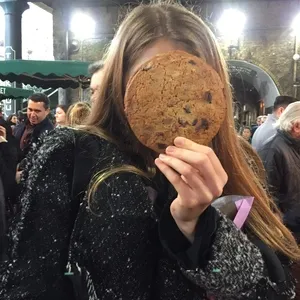We’ve all struggled over the pronunciation of macaron. Does it sound similar to the name of the current French president? Or do you say the “on” part like when you’re checking your watch to see if “noon” has arrived and it’s time for your lunch break. Whichever way you’ve decided to pronounce the confection, this has caused a ruckus in terms of understanding the difference between macaron vs macaroon. Let’s clarify the mix-up, shall we?
What’s a macaron?

Macarons are your everyday gourmet French sandwich cookie made with ground almonds, egg whites, and sugar. Much like an Oreo, they have a sweet filling in the middle. But in the case of macarons, you can find the likes of ganache, buttercream, and fruit curd in between your two cookies.
Macarons also come in an assortment of flavors and colors that span the rainbow, but my personal favorite is one I tried from Bottega Louie in DTLA. It was their special “Birthday” flavor that tasted just like those pink and white frosted animal cookies we all snacked on as kids. I’m salivating just thinking about them.
And what’s a macaroon?

For those who have not lit the candles on a menorah, macaroons are desserts likely to be found in Jewish households, especially around Passover. As you can see, the case for macarons vs macaroons can be made in terms of appearance, as they clearly look vastly different. Macarons are sandwich cookies whereas macaroons are like small, individually-portioned cakes.
And as far as composition goes, macaroons are also made of egg whites and sugar. Until the late 1800s, they had a nut-base, but are now most often made with strips of coconut. You can also find fancy ones dipped in chocolate (those are my dad’s favorite).
Why the confusion?
The origins of macarons and macaroons are interlinked. Both cookies were once made with almond paste and were originally flourless and unleavened. So the macaron vs macaroon quetion really whittles down to a tale of similar origins.
If any of you watched the CW show Reign, you’re more than likely familiar with former French queen Catherine de’ Medici. ICYMI, she was a fan of macarons long before Chuck ever brought them back from Paris for Blair on Gossip Girl.

According to the Food Network, Florentine Catherine brought her own Italian chefs to the French court, where they developed the initial macarons made with ground almonds. But the sandwich cookie where almond paste or ganache is spread between two individual macarons became popularized by world-renowned pastry shop Ladurée in the early 1900s.
On the other hand, the macaroons rose to prominence in Jewish cookbooks around the same time that coconut emerged out of India in the late 1800s. Since the 1930s, coconut and almond macaroons have become bestsellers during Passover due to their lack of flour.
That’s all for the battle of macarons vs macaroons. In fact, it’s not really a battle at all. In the case of these treats, they share a common Sicilian ancestor and just evolved into different kinds of desserts prized by different cultures. But at least now we get to reap the benefits of both descendants. Hallelujah!


